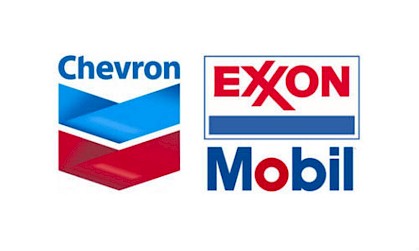Investors reject climate proposals targeting ExxonMobil, Chevron
 Nearly two-thirds of investors in ExxonMobil and Chevron on Wednesday rejected proposals for the oil giants to align their climate strategies with the Paris agreement.
Nearly two-thirds of investors in ExxonMobil and Chevron on Wednesday rejected proposals for the oil giants to align their climate strategies with the Paris agreement.
The votes were yet another sign that climate activist investors are having a less successful proxy season this year than in 2021, as fossil fuel firms reap record profits fueled by the war in Ukraine.
The details: Both oil majors held their annual shareholder meetings on Wednesday. At ExxonMobil’s meeting, around 28 percent of investors voted in favor of a proposal from the Dutch climate activist group Follow This, while roughly 33 percent of Chevron’s investors backed the resolution.
The proposal calls on the companies to set medium- and long-term targets for aligning their emissions trajectories with the Paris agreement. While ExxonMobil and Chevron have both set goals of reaching net-zero operational emissions by 2050, critics such as Follow This argue that these plans are not Paris-compliant.
Mark van Baal, the founder of Follow This, told The Climate 202 that he was grateful for the support from nearly one-third of investors, which he said represents a small but significant minority.
“It’s still a shareholder rebellion,” van Baal said. “And the only thing we can do now is work with these investors to convince the rest.”
ExxonMobil CEO Darren Woods urged investors to reject Follow This’s resolution at the meeting, saying it would curtail energy supplies at the height of the supply crunch related to the war in Ukraine.
“We do not believe it’s in the best interest of our shareholders or society for ExxonMobil to reduce the supply of critical products needed by society, which is the intent of your proposal,” Woods said.
At shareholder meetings earlier this month, investors in BP, ConocoPhillips and Equinor also beat back climate proposals. So far, the 2022 proxy season has struck a sharp contrast with last year, when the small activist hedge fund Engine No. 1 shocked the world by winning three seats on ExxonMobil’s board.
Activists notch smaller wins
About 52 percent of ExxonMobil shareholders did approve, however, a resolution calling on the company to issue an audited report assessing the impact of a net-zero emissions world on its financial statements.
The shareholder proxy advisory services Glass Lewis and ISS recommended voting for the motion, which was spearheaded by Christian Brothers Investment Services, an investment management firm that works with Catholic individuals and institutions.
“We think more transparency is always a good thing,” John Geissinger, the firm’s chief investment officer, told The Climate 202. “We’re glad the majority of shareholders agreed with us.”
Nearly 98 percent of investors also approved a resolution from Mercy Investment Services requiring the board to issue a report on “the reliability of Chevron’s methane emission disclosures.”
Mary Minette, Mercy’s director of shareholder advocacy, said in an email that she was “very pleased” to see investors recognize the importance of “accurate and transparent measurement” of methane, a powerful planet-warming pollutant.
From the boardroom to the courtroom
Meanwhile, at Royal Dutch Shell’s meeting on Tuesday, 20 percent of investors supported Follow This’s resolution, down from 30 percent last year. A majority of investors backed Shell’s current climate strategy.
“We are pleased that the overwhelming majority of shareholders continue to support Shell, our energy transition strategy and the progress we have made in the past 12 months,” Shell CEO Ben van Beurden said of the voting results. “We are on the right track.”
Tuesday’s meeting came two days before the first anniversary of a historic Dutch court verdict ordering Shell to slash its emissions 45 percent by 2030. Shell is appealing the ruling, despite calls from Odey Asset Management to drop the appeal.
Milieudefensie, the Dutch wing of the environmental group Friends of the Earth, helped bring the lawsuit over Shell’s emissions targets. Nine de Pater, a campaigner for the group, slammed the oil company for continuing to resist the ruling.
“Shell and its board of directors are not taking the climate crisis seriously,” she said. “They don’t have concrete and sufficient plans to comply with the verdict. And that means that they will continue to endanger people’s lives.”
A Shell spokeswoman said in an email that the court decision unfairly targeted one firm, rather than requiring every oil major to slash emissions.
“Shell agrees that for the world to make the transition to cleaner energy, we must move quickly, but we must also move together,” the spokeswoman said. “The Milieudefensie ruling imposes regulation against one company without setting clear policy and regulatory framework needed to drive change across the global energy system.”
You can return to the main Market News page, or press the Back button on your browser.

